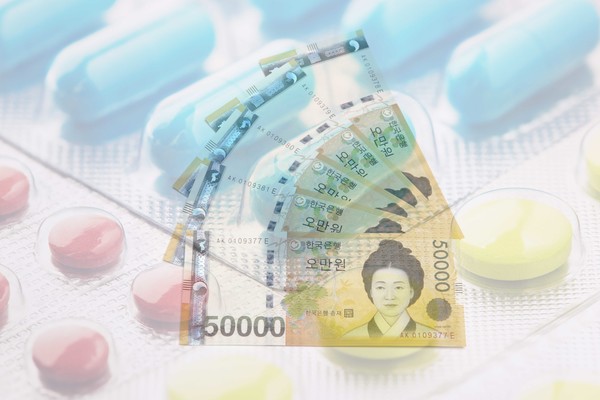Cash reserves of Korean biopharmaceutical companies are shrinking, causing concerns that several companies may go bankrupt in the worst-case scenario.

According to industry watchers, Korean biopharmaceutical companies are facing headwinds in attracting investments because the financial markets nearly grinded to a halt with central banks raising interest rates worldwide. Plus, most Korean biopharmaceutical firms are showing a sluggish performance in new drug development.
According to the Financial Supervisory Service data, as of last year's business report, the average cash reserve of the top 20 local biopharmaceutical companies ranked by market capitalization on the Kosdaq market stood at 44.4 billion won ($31.8 million).
Alteogen had the largest cash holdings among the top 20 companies, with the company's cash reserve amounting to 203 billion won. Lego ChemBio ranked second with 139.9 billion won, followed by MedPacto with 121.6 billion won, Cellivery Therapeutics with 69.3 billion won, Mezzion Pharma with 47.2 billion won, and Helixmith with 42.4 billion won.
On the other hand, the remaining 14 companies had a cash reserve of fewer than 40 billion won.
Notably, the cash reserve of EOFlow and Canaria Bio was below 10 billion won.
The problem is the increasing burden of R&D expenses is weighing on such bio companies with small cash holdings.
The 20 companies spent 12.4 billion won for R&D cost on average in 2019, 15.5 billion won in 2020, and 16.3 billion won in 2021.
ABL Bio spent the most (42.8 billion won) on R&D for three years, nearly eight times its sales last year.
For some companies, if they fail to raise additional funds, they will likely exhaust all their cash reserve within the year with R&D expenditure alone.
Analysts warned that cash exhaustion could speed up as companies also have other cash expenditures such as expenses for sales, general costs, and administration.
Raising capital had not been an issue for the biopharmaceutical companies during the past two years but the investor sentiment toward the biotech sector has considerably weakened and companies will not find it easy to raise funds, an analyst said.
"A lot of investment companies and venture capitalists have become doubtful about investing in Korean biopharmaceutical companies," said the analyst, asking to remain anonymous due to the sensitivity of the issue. "They are finding it hard to invest in biopharmaceutical companies that do have any revenue source because even companies with good revenue results are also losing big in the stock market."
The analyst said a lot of biopharmaceutical companies without any revenue sources have been raising capital through issuing convertible bonds, bond with warrant, or bonds. This was a reason why investor sentiment in the biotech sector has weakened, he said.
The weakening won against the U.S. dollar is another problem for the biotech industry.
The won once hit the lowest point in about 13 years to trade at 1,397.9 won against the dollar on Thursday.
Most Korean biopharma firms import materials and samples for basic research or clinical trials. If the won falls, import costs of raw and subsidiary materials and overseas clinical costs increase.
"This, in turn, can make it harder for biopharmaceutical companies to receive investment as they have nothing new to show to investors," the analyst said.
Industry watchers have pointed out that biotech firms should minimize the outflow of funds by prioritizing pipelines and concentrating costs on tasks that are most likely to succeed in new drug development.
"During a period when financing costs were low, expectations for business expansion acted as a trigger for share prices to rise," Hana Securities analyst Park Jae-gyeong wrote in a report. "However, in a situation where the value of cash is increasing, it should be taken into account that expansion into areas with low relevance to existing capabilities is a waste and may lower the probability of success."
As biopharmaceutical companies have less manpower and capital than multinational pharmaceutical companies, they need to find a strategy to focus on platform technology or specific disease groups, Park added.
Related articles
- 4 bio companies seek to list shares on Kosdaq market in September
- Kolon TissueGene to get more funding from parent group, its chairman
- Strong dollar brings about mixed results for Korean drugmakers
- Helixmith patents new neuropathic pain therapy in Russia
- Cellivery at risk of delisting after receiving a disclaimer opinion from auditor

